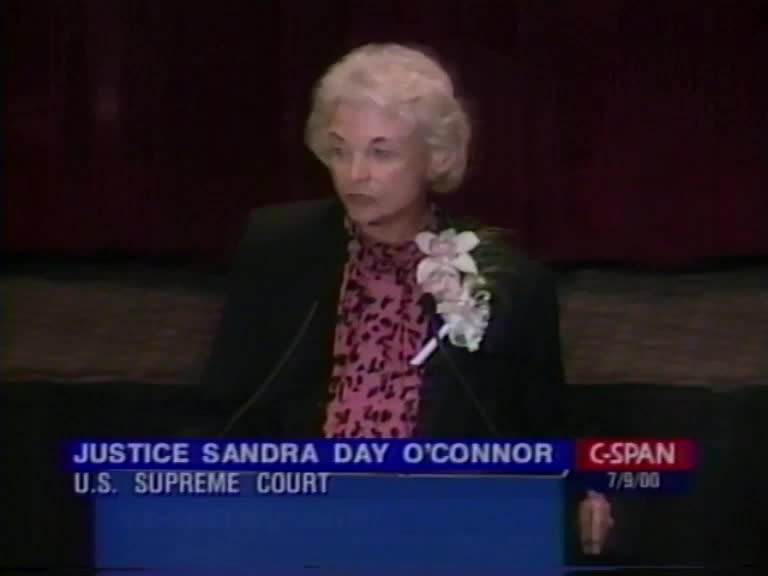Sandra Day O'Connor
Thank you.
Thank you. Thank you.
Thank you. Thank you.
Thank
Thanks. Thank you so much.
What a special day this is for all of your honorees
and how happy I am to be in the company today with such a remarkable group of women honorees, I can't imagine a better group and I have sat today fascinated with every single one of them and everything they had to say. I've heard how special this event always is. And I've not been able to attend all these luncheons, but I think I'm gonna have to come back because
I grew up as a cowgirl in the southwest. And I learned out there that the only thing that mattered was whether you could lend a hand and do it well. It didn't matter whether you were black, white, or brown, male or female, young or old, you're just had to do your job. And it was a place where everything around you could hurt you. If you didn't watch out. You could run into a rattlesnake. You shook your shoes out to get rid of the scorpions. Every time you fell off your horse, you were in danger of falling into a cactus. I mean everything out there could bite, prick, tear, cut, or whatever it was. And all I ever wanted to be was a cattle rancher. That was all I knew. My grandparents had done the same, and my family. And it's been a long road from that dry, barren Southwest cattle ranch, to the marble courtroom, where I often find myself sitting today. It's been a very long and often a very hard road for women lawyers, since Margaret brand became the first woman allowed to practice law on this continent and 1648. And most of that progress, amazingly enough has been in my lifetime.
Now, like Miss round free, I'm pretty old now. So we've seen a lot. But that progress has been in my lifetime. And what changes there have been have largely occurred in the last half of the 20th century. I think that those changes are here to stay. And there is not a day of my life life, that I'm not grateful that I'm alive in this country at this time, rather than perhaps living in Afghanistan, or one of the African countries that struggling so hard today or someplace else where women still don't have a chance. And we've been so privileged to be in this nation, and living under a rule of law. we sometimes forget what an island we live in of opportunity for all of us today. The American Bar Association has played a great role in trying to take our concepts of the rule of law around the world to other areas that are trying to form institutions today, to enable them also to live in a free market environment. And in the society of nations today, and the American Bar, and with Bill Paul's help I is expanding those efforts around the globe. That's a great thing.
Next week, some of you may be going on to England for the continuation of this meeting. And there will be a special ceremony at Runnymeade. Why Runnymeade? Because that's where King John signed the Magna Carta. And that was the first time that a decree was officially signed, saying yes, even the king has to live under the rule of law. And that's a great concept. It's what has enabled all of these special women here today, and all of you women lawyers in the audience today to achieve what we have, frankly. And it's what we'd like to spread across our borders and across national borders around the world. And with a little bit of help, I think we're going to make some progress.
I accept this award with joy and with a great deal of humility. It belongs Of course, not just to these women here today, but to all those redoubtable women lawyers who refuse to be deterred by rejection and by humiliation. And but for them, we wouldn't be here today. And we're certainly going to call you miss Roundtree not collect. We're all going to leave here and we're going to try to be about something and to do something and to remember that it's great to be the first and it's important, but it's even more important not to be the last Thank you

